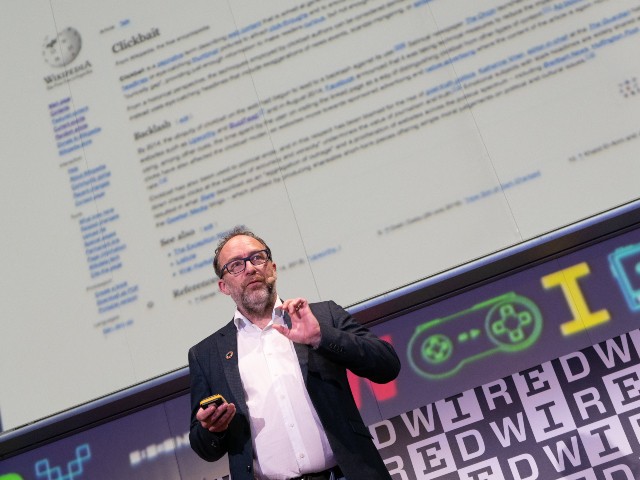Jimmy Wales, co-founder of Wikipedia, recently gave up his administrative privileges on the online encyclopedia after a request to review his conduct was brought before the site’s Arbitration Committee, often likened to a supreme court. The request concerned Wales publicly accusing a former member of the Committee of being involved with a paid editing scam without properly vetting the claims beforehand. Wales still retains limited privileges under his “founder” role.
Paid editing is a controversial practice allowed under Wikipedia policy to a degree only when it is publicly disclosed. Wales has previously faced controversy over his use of his position, including in response to allegedly inappropriate editing by people with conflicts of interest.
Wales publicly confronted former member of the Arbitration Committee “Bradv” last month on Wikipedia about what Wales claimed was a “credible report” that Brad had recommended the paid editing firm WikiExperts to someone using the WhatsApp online messaging service. He claimed the firm then charged $15,000 for an article. The Wikipedia co-founder asked Brad if the report was true, stating he should no longer have admin privileges if that were the case. At the time Wales posted his accusations, Brad had not even edited Wikipedia in nearly a year.
The accusation sparked a flurry of discussion in response, entirely critical of Wales making a serious public accusation based off a single report. Current and former members of the Committee were quick to criticize Wales for his conduct, noting private reporting mechanisms existed and that what he was told about was likely another party impersonating Brad, a common practice. One current member of the Committee stated he was “sickened” by the Wikipedia co-founder’s conduct. After reciting many of the criticisms others provided, he finished by saying Wales should give up his admin privileges on the site instead.
Responding to the criticism, Wales apologized for his tone, but defended his raising of the matter by noting the consequences would be serious whether it was an impersonation or not. People criticized this response, with editor “MarioGom” outlining how his defense and apology were completely inadequate, emphasizing that he should not keep pursuing the matter publicly given the nature of the accusations and potential for impersonation being involved. A member of the Arbitration Committee echoed his sentiments. Under pressure Wales sent his evidence privately to the Committee, though Committee members reviewing the evidence found nothing concerning Brad.
One former member of the Committee, upon seeing this response, filed a request before the Arbitration Committee to have the Wikipedia co-founder’s conduct reviewed. While many commenting on the request reiterated their objections, some editors weighed in to argue editors were overreacting because Wales was the one involved. They stated editors are expected to raise concerns about paid editing and conflicts of interest with the editors, though some still acknowledged that the way Wales raised those concerns was inappropriate with some suggesting a mere admonishment was sufficient response.
As the request was being discussed, the Committee mentioned receiving evidence more clearly outlining the incident. Committee member “GeneralNotability” described the evidence as showing an individual claiming to be Brad telling another person that a “verified editor” was needed to get an article published, referring the person to the WikiExperts paid editing firm. The party claiming to be Brad proceeded to make various spurious claims inconsistent with Wikipedia processes and policies to push the other party to pay the firm thousands of dollars for an article. When the article failed to stay up, the person requested a refund, but was denied. “GeneralNotability” stated the person claiming to be Brad “clearly wasn’t” who he said he was, and likely wasn’t a native English speaker either.
Every other Committee member who reviewed the evidence echoed this assessment, noting that the conversation showed an obvious attempt to scam a person desiring a Wikipedia article by impersonating a former member of the Committee as well as another administrator on the site. While the Committee generally agreed that the evidence was so inadequate that Wales should not have publicly accused Brad, they differed on how to respond to his conduct. Some advocated having a case and potentially discussing removal of his administrative privileges, while others suggested admonishing Wales without taking further action.
Before a decision was made by the Committee, Wales posted a statement at the case request announcing that he was having the Trust and Safety staff at the Foundation that owns Wikipedia remove his administrative privileges on the site, noting that he had not used them in years. He acknowledged his improper handling of the accusations against Brad, stating he was unaware the former Committee member had long been inactive on Wikipedia. In conclusion, he insisted the discussion should shift away from him and to a paid editing scam that allegedly cost someone $15,000. Following his relinquishing of administrative privileges, the Arbitration Committee declined the case.
Days later, Brad commented on the case to expressly deny the accusations against him and criticize Wales, though stating he believed his actions were due to insufficient knowledge of the paid editing issue. Brad also emphasized a general need for better communication on paid editing scams. He concluded by stating Wales should be seen to have resigned privileges “under a cloud” due to the controversy, meaning he would be expected to seek community approval to regain those privileges.
While Wales gave up most advanced privileges on Wikipedia, he still retained a “founder” role created specifically for him. Unlike his admin privileges, the founder role does not allow him to sanction editors, delete content, or restrict page access, but does allow him to view content only accessible to those with advanced privileges. In addition, Wales retains the right to review and act on appeals of decisions made by the Arbitration Committee when it does not concern his own actions. However, editors have also discussed removing that right. Wales also retains his position on the Board of Trustees for the Foundation that owns the site.
Previous instances of Wales using his advanced privileges on Wikipedia and related sites have also sparked controversy. In 2010, Wikipedia co-founder Larry Sanger complained of alleged instances of child pornography on the Wikipedia-affiliated image hosting site Wikimedia Commons, specifically referring to visual representations such as drawings. Wales responded by deleting a large number of sexually explicit images from Commons, prompting outcry from some members who contended that images with genuine educational value were deleted. The outcry prompted Wales to give up his deletion privileges on Commons.
Such controversies have also previously involved his handling of alleged conflicts of interest and paid editing. In a 2011 incident, Wales banned editor “TimidGuy” over claims the editor was engaged in promotional editing for the “Transcendental Meditation” movement. The ban was subsequently appealed to the Arbitration Committee, who found the allegations did not merit any sanction and lifted the ban. The administrator who pushed the claims on Wales was consequently banned for over two years because of his conduct towards the accused editor with several members of the Committee at the time also stating it was based on him deceiving Wales into imposing a ban.
In spite of his own conduct on the matter, Wales has been unreceptive to those in similar situations. This author was banned from Wikipedia by the Arbitration Committee after reporting an administrator for violating policies on conflicts of interest and appealed the ban to Wales. Although the Committee admitted to imposing the ban in a secret proceeding where this author was not told the reasons for the ban nor allowed to present a defense beforehand in contravention of binding policy and Wales had previously stated he would overturn such an action, he instead rejected the appeal.
Editing by people with conflicts of interest, particularly paid editing, is a serious recurring issue. Aside from undisclosed paid editing that violates site policy, those who attempt to operate within policy on behalf of those in politics and business often push promotional edits into Wikipedia. Even Wales himself had once been caught breaching standards on conflicts of interest when he altered his own page to minimize the role fellow co-founder Sanger played in establishing Wikipedia and pushing himself as “sole founder” of the site.
Unlike others who helped establish major Internet properties, Wales was unable to achieve significant financial success off Wikipedia. Instead, he has established various for-profit ventures attempting to capitalize on the “wiki” brand. One of his first ventures was the fan-focused Wikia, since rebranded as Fandom and now owned by private equity firm TPG. At one point Wales attempted to build a search engine off Wikia to challenge Google, though the effort failed. He has similarly tried to establish a challenger to news media with WikiTribune, though this was also closed down and converted into a social media network. Both WikiTribune and Wikia have been plagued by issues of left-wing bias, as well.
Failure to achieve any notable success in profiting off his reputation as co-founder of Wikipedia means his role on the online encyclopedia is his biggest asset and biggest liability. It means Wales is elevated by media and business for his association with one of the Internet’s main information sources, such as receiving an advisory board position at “misinformation watchdog” NewsGuard or being asked his ostensibly compelling predictions on the chances of success for other Internet ventures.
However, Wales also often defends Wikipedia from critics. Twitter owner and Tech billionaire Elon Musk criticized Wikipedia’s left-wing bias last year, prompting insults from Wales. Musk subsequently challenged Wales when partisan left-wing editors attempted to delete Wikipedia’s article on the “Twitter Files” released by Musk, which exposed the prior leadership’s partisan anti-Trump censorship during the 2020 presidential election. Wales was also caught in the dispute over GamerGate on Wikipedia where left-wing editors slanted the article against the anti-corruption movement in gaming. Media and academics have widely copied Wikipedia’s article. Wales also has to contend with fellow co-founder Sanger, who has criticized Wikipedia’s left-wing bias many times. Numerous studies have demonstrated the site’s left-wing bias.
(Disclosure: The author has previously been involved in disputes on Wikipedia with some parties referenced in this article)
T. D. Adler edited Wikipedia as The Devil’s Advocate. He was banned after privately reporting conflict of interest editing by one of the site’s administrators. Due to previous witch-hunts led by mainstream Wikipedians against their critics, Adler writes under an alias.


COMMENTS
Please let us know if you're having issues with commenting.